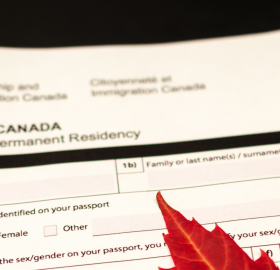What You Need to Know About the Skilled Worker Program
The Federal Skilled Worker (FSW) program is a part of the Express Entry process. This program is an immigration option for people who are selected to come to Canada because of their work experience and skills.
Skilled workers are chosen as permanent residents based on their education, work experience, knowledge of English and/or French, and other factors. These things often help them succeed in Canada.
This program has minimum requirements for skilled work experience, language ability, and education. You must meet all the minimum requirements to be eligible.
Work Experience Requirements
To immigrate to Canada under the Skilled Worker program, your work experience must be either Skill Type 0, Skill Level A or Skill Level B on the Canadian National Occupational Classification (NOC).
Your work experience must be paid, full-time (30 hours per week) or the equivalent hours part-time. You must have had that work experience during the last 10 years.
These limits do not apply if you have a permanent job offer.
Proof of Funds
You must show that you have enough money for you and your family to settle in Canada unless you are currently able to legally work in Canada or have a valid job offer from an employer in Canada.
How much money you’ll need to support your family depends on the size of your family. To calculate the size of your family you must include
- yourself
- your spouse or partner
- your dependent children
- your spouse’s dependent children
If you believe you are interested in the Federal Skilled Worker program, contact us today!
10 Tips to Help You Get Settled in Canada
There is an excitement and nervousness that you feel when you first arrive in your new Country. You have arrived in Canada, and now you have so many questions. Where do you begin when it comes to getting settled?
Here are 10 tips which can get you headed in the right direction:
- Find your first home in Canada. Whether you decide to rent or purchase, having your first home will be a major accomplishment in your Canadian journey. Check out these top considerations when looking for a place to call your own.
- Shop for appropriate clothing. If you came from a tropical country, you will need proper winter clothing that will stand-up in colder temperatures. Items such as a winter jacket, winter pants, and winter boots – pick ones that are water proof and have good grip. You will also need gloves, scarves, warm socks and toques. Keep yourself warm and dry during the winter months.
- Open a Canadian bank account. Anyone can open a bank account in Canada if they meet the identification requirements set out in the Bank Act. A bank account lets you write cheques, use automated banking machines (ABMs), get paid through direct deposit, and use a debit or credit card for purchases. You can open an account even if you don’t have a job yet or money to deposit, or if you’ve been bankrupt.
- Apply for your Social Insurance Number (SIN) and Healthcare Card. This very important, and you should do it in your first week if possible. Learn how to apply for your SIN card and healthcare card.
- Find a Family Physician. Family doctors treat a wide range of conditions, and are often your primary care providers. In the long term, that means you will want to build a lasting relationship with a family physician. Developing such a relationship allows them to know your medical history inside and out, helping them make accurate diagnoses, watch for red flags regarding medications and monitor changes in your health through the years.
- Find a specialist or consultant for Newcomer’s to Canada. Building a relationship with an immigration specialist will provide you with a resource who can provide information and direction throughout your Canadian journey. They will give you advice, provide information and resources, as well as suggest next steps.
- Strengthen your English with free courses. If you’re a permanent resident or a protected person, you can take language classes at no cost to you. English is a confusing language with lots of words and phrases that are more common in speech than writing, and are typically restricted to a particular context. Practice will strengthen your English abilities and help you get better at identifying appropriate context. Learn more about these classes.
- Get educational equivalency. Being new to Canada it’s really hard to get your dream job right away. Submiting your Educational transcript for equivalency may be a stepping stone to get you there faster. After you receive your equivalency, take it to any college or university and show your IQAS result. The educational institute will decide what additional courses you need based on this information. The advantage of sending your educational documents to IQAS is you may not have to upgrade any additional English or Math, allowing you to start taking other courses right away.
- Make new friends or contacts. Join local sports groups, find a volunteer job, reach out to your new neighbours, or attends short courses. Meeting new people will help you get settled in your new life and can prove beneficial in a variety of areas from personal to professional.
- Find a job. Looking for a job in Canada is like a diving into a “deep blue sea”. Remember you are in a new country and accepting any job will help you overcome challenges that may come up during your settlement period. Stay motivated to reach your goals and you will be successful.
These stepping stones can give a starting point for settled in Canada and help you along the path to living your Canadian dream.
Get to Know the Alberta Opportunity Stream
The Alberta Opportunity Stream (AOS) is a pathway to permanent residence in Canada for migrants working in Alberta and international graduates who have completed their studies at an approved Alberta post-secondary institution.
If you’re interested in the AOS, there are a number of eligibility requirements you must meet in the following categories’
- Residency status and work permit
- Occupation
- Language
- Education
- Work experience
Each category has specific requirements that applicants must be met at the time your application is postmarked and at the time the Alberta Immigrant Nominee Program (AINP) assesses your application. Here are some of the details you should know before applying.
Residency Status and Work Permit Requirements
You must have a valid work permit for an eligible occupation to apply for AOS. Valid work permits are based on one of the following:
- a positive Labour Market Impact Assessment (LMIA)
- an LMIA exemption for workers based on one of the following exemptions as determined by Immigration, Refugees and Citizenship Canada (IRCC):
- international trade agreements
- workers transferred within a company
- International Experience Canada
- Mobilité Francophone
- Post-Graduation Work Permit (PGWP) holder
Post-Graduation Work Permit holders must also meet additional education and occupation requirements:
- Your current occupation must be related to your field of study in Alberta.
- If you are admitted and enrolled in your Alberta credential program before April 1, 2019, your credential must be issued by an Alberta Advanced Education approved Alberta public and private post-secondary institution and must be one of the following Alberta Advanced Education approved credentials:
- certificate or post-graduate certificate (minimum one year in length)
- diploma program (minimum 2 years in length)
- undergraduate bachelor’s degree
- graduate-level degree
- graduate-level certificate
- graduate-level diploma
Ineligible applicants
The following people cannot apply for the Alberta Opportunity Stream:
- Refugee claimants or individuals involved in a federal appeal or removal process.
- Temporary residents living or working in a province or territory of Canada other than Alberta.
- Migrants living or working in Canada who do not have valid temporary resident status.
Occupation requirements
To be considered for AOS, you must:
- work in an eligible occupation in Alberta
- work in an occupation that matches your previous work experience
If you are unsure whether your occupation is on this list contact our team of experienced RCICs for an initial consultation at info@activeprofessionals.com.
Language requirements
It is important that you are able to demonstrate you meet the following language test score in English or French:
- Canadian Benchmark (CLB) test score required a minimum of 4 for each English language skill, or
- Niveaux de compétence linguistique canadiens (NCLC) test score required a minimum of 4 for each French language skill
If you apply to the AINP under NOC code 3413 (Nurse aides, orderlies and patient service associates), the AINP requires a minimum language test score of:
- CLB of 7 for each English language skill, or
- NCLC of 7 for each French language skill
You must provide your official test results with your AINP application for one of the following language tests:
- Canadian English Language Proficiency Index Program (CELPIP) General Test
- International English Language Testing System (IELTS) General Training Test
- Test d’évaluation de français (TEF)
- Test de connaissance du français (TCF)
Official test results will need to be less than two years old when you submit your application. The AINP will not accept confirmation of registration to take a language test in place of a test result.
Check the federal guideline on CLB/NCLC equivalency for each of the tests.
Education requirements
Eligible applicants
At the time your application is postmarked you must have completed a minimum of high school education in your country of origin.
Post-Graduation Work Permit holders
Post-Graduation Work Permit holders must meet additional education and occupation requirements:
- Your current occupation must be related to your field of study in Alberta.
If you are admitted and enrolled in your Alberta credential program before April 1, 2019, your credential must be issued by an Alberta Advanced Education approved Alberta public and private post-secondary institution and must be one of the following Alberta Advanced Education approved credentials:
- certificate or post-graduate certificate (minimum one year in length)
- diploma program (minimum 2 years in length)
- undergraduate bachelor’s degree
- graduate-level degree
- graduate-level certificate
- graduate-level diploma
If you are admitted and enrolled in your Alberta credential program on or after April 1, 2019, your credential must be on the Alberta Opportunity Stream List of Alberta Advanced Education Approved Post-Secondary Credentials.
Work experience requirements
Your “current occupation” is the occupation you are working in at the time your application is postmarked to the AINP.
Your current occupation must also match your work experience at the time your application is postmarked and at the time the AINP assesses your application.
Qualifying work experience
At the time your application is postmarked you must have either:
- a minimum of 12 months full-time work experience in your current occupation in Alberta within the last 18 months; or
- a minimum of 24 months of full-time work experience in your current occupation in Canada and/or abroad within the last 30 months
- This work experience can be a combination of experience gained in Alberta, in Canada (outside Alberta) and/or abroad.
- Post-Graduation Work Permit holders require a minimum of 6 months of full-time work experience in your current occupation in Alberta within the last 18 months.
This occupation must be related to your field of study in Alberta of your Alberta Advanced Education approved credential at an Advanced Education approved Alberta public and private post-secondary institution.
If you are admitted and enrolled in your Alberta credential program on or after April 1, 2019, and you completed an Advanced Education-approved one-year post-graduate certificate, your occupation must also be related to your previous undergraduate or graduate field of study outside Canada.
Work experience in the qualifying period:
- must have been full-time, for a minimum of 30 hours a week
- must be for the same occupation as your current occupation
- must have been authorized by Immigration, Refugees and Citizenship Canada and with valid temporary resident status if completed in Alberta or Canada
- cannot have been gained while studying in Canada and doing co-op work placements or internships as part of a study program*
*There is an exception to this rule if you are a Post-Graduation Work Permit holder. Work experience completed during paid co-op work terms that were part of a program of study at an Alberta post-secondary institution can be used to meet the work experience criteria with the following conditions:
- the paid co-op work term was full-time (minimum 30 hours per week)
- the work experience is directly related to your current occupation
- the work experience was all gained in Alberta
You must have the required licensing, registration or certification to work in your current occupation in Alberta at the time your application is postmarked and at the time the AINP assesses your application for nomination
If you are working in a compulsory trade in Alberta you must have a valid Alberta Apprenticeship and Industry Trade (AIT) recognized trade certificate.
Eligible job offers
At the time your application is postmarked and at the time the AINP assesses your application for nomination, you must have a bona fide full-time job offer or employment contract from an Alberta employer to work in your current occupation in Alberta.
Your Alberta employer must be incorporated or registered by or under an act of the legislature of a province, territory, or the Parliament of Canada and operating as a business that has an established production capability, plant or place of business in Alberta.
Your job offer or employment contract must be signed by you and your Alberta employer and must offer:
- continuous paid work
- full-time work, defined as a minimum of 30 hours/week
- employment for 12 months or more
- work in your current occupation
- wages and benefits that meet provincial minimum wage and:
- meet or exceed the requirements set out in your LMIA, or
- if you are LMIA exempt, meet or exceed minimum the starting wage for your occupation across all industries in Alberta as set out on the Alis website
- work for an eligible AINP occupation for which you have a work permit that meets AINP work permit requirements
You must meet the terms agreed to in your job offer or employment contract at the time of application and assessment.
Ineligible applicants
The following individuals are not eligible, even if they have a job offer to work 30 hours a week or more in a 12-month period:
- part-time or casual employees, regardless of their working hours
- independent contractors, business owners or temporary agency workers, including individuals listed as Directors, Shareholders or Agents of the Alberta employer on the Corporate Registry System (CORES)
- employees who work in Alberta in a place of employment that is not zoned for commercial or industrial operations, such as a home-based business
- employees who do not work on premises in Alberta, such as those who work in a “virtual” location or serve the employer by telecommuting from a location outside Alberta
Learn How to Write a Canadian Style Resume
You might be wondering why, after sending so many resumes, you have not received a ton of responses yet. As a new immigrant to Canada there are a number of potential differences between the way you are used to writing a resume and the Canadian expectations. Learn these Canadian resume tips to strengthen your job search and improve upon your most important marketing tool in the interview process.
- Keep it short and concise. In Canada, most people have a resume that is a maximum of two pages long. Keep it to one page if are a recent graduate or do not have a lot of experience.
- Include your contact information for the potential employer to reach you. Provide information such as a phone number, email address and mailing address. Don’t attach a photo or any personal information including gender, marital status, or religion.
- Change your resume for each job you apply for. It is important to only include skills and experience relevant to the position such as the proper name of previous companies, where the business was located, and the title of the job that you had and a brief description of the position. Also, include any volunteer work you have done. Do not include personal interest and hobbies unless they are relevant to the position
- Ensure your resume format style is consistent. You should avoid long paragraphs and small fonts, 12 point font is standard. Use an easily readable font and make sure that only one font is used throughout. Ensure your resume format style is consistent.
- Have an up-to-date online resume. LinkedIn is a professional online platform that is frequently used in Canada for networking and the job search process. Many employers’ look-up job applicants on LinkedIn as well as other social media sites like Facebook and Twitter so make sure they are up-to-date and match the professional image you would like to portray.
- Finally, it is always a good idea to have your resume proofread by another person who is fluent in the language for typos, proper grammar, and completeness.
Once you apply these tips, you can start to focus on the interview preparation process. Happy job hunting!
Stay in Canada After You Graduate
Are you an international student who is about to complete your post-secondary education in Canada? Do you wish to stay in Canada after you graduate and obtain Canadian work experience? Then the Post-Graduation Work Permit program (PGWPP) may be what you’re looking for.
To work in Canada after you graduate, you need a work permit. The PGWPP allows students who have graduated from eligible Canadian designated learning institutions to obtain an open work permit and gain valuable Canadian work experience. An advantage of this program is that the work experience you gain may help you qualify for permanent residence.
How Long Will My Permit Be?
The duration of your post-graduation work permit (PGWP) will depend on the length of your study program. If your educational program was between eight months to two years, your PGWP may be valid for up to the same length as your study program. Alternatively, if the education program you completed was two or more years, then your PGWP may be issued for 3 years. If you complete more than one eligible program, you may be able to get a PGWP that combines the length of each program.
Programs that run for less then eight months are not eligible for the PGWPP. You also can’t get a PGWP if you already had one after completing an earlier program of study.
Am I Eligible?
On February 14, 2019, the Government of Canada extended the time to apply from 90 to 180 days, six months, after your designated learning institution issues your final marks confirming that the requirements to complete the program of study have been met.
You must also have maintained full-time status as a student in Canada during each semester of your study program (except your final semester, which can be part-time, or if you took a leave from studies) to be eligible.
Special cases:
If you’re in any of these groups, there are unique requirements to be aware of that may influence your eligibility.
- Accelerated programs
- Distance learning
- Leave from studies
- Transfers between schools
- Canadian study programs with an overseas component
- Flight school graduates
What Happens if I Don’t Qualify?
If you’re not eligible for a PGWP, you may still be able to work in Canada after you graduate. Contact us to have one of our Regulated Canadian Immigration Consultants help you determine the best program for your situation.
Interim Pathway for Caregivers – The Basics
The Interim Pathway for Caregivers is a dedicated pathway to permanent residence for qualifying in-home caregivers in effect March 4, 2019 until June 4, 2019. If you have work experience in Canada as a home child care provider or home support worker, you may be able to apply for permanent residence.
To be eligible to apply, you must have the required:
- status in Canada
- work experience
- language levels (CLB 5 in English or NLCL 5 in French)
- education (equal to a Canadian secondary school, also known as high school, diploma)
You must also plan to live outside the province of Quebec.
At the Time You Apply
To meet the status requirements when you apply, you must either have a valid work permit; have applied to extend your work permit and be waiting on a decision; or have applied to restore your status as a worker.
For your work experience in Canada to be eligible, you need to have worked as a home child care provider, a home support worker, or a combination of the two. You will also need to have gained this experience while working in the Temporary Foreign Worker Program.
You will also need to have at least 12 months of full-time work experience (at least 30 hours of paid work per week) since November 30, 2014. Breaks in employment (for example, periods where you weren’t working, on sick leave or parental leave) are allowed, however, any work experience you had while you were a full-time student doesn’t count.
It is important to note you’ll have to include documents to show proof of your work experience in your application.
If you’re interested in applying and believe you meet the above criteria, contact us. We would love to assist you with the application process.
What You Should Know About Biometrics
 The second phase of Canada’s biometrics collection program came into force as of December 31, 2018. With this second phase, nationals from countries in Asia, Asia Pacific and the Americas must give their fingerprints and submit photos (biometrics) when applying for a Canadian visitor visa, study or work permit, or for permanent residence. This rule came into effect for applicants from countries in Europe, the Middle East and Africa on July 31, 2018, and for temporary resident applicants from 29 countries and 1 territory in 2013.
The second phase of Canada’s biometrics collection program came into force as of December 31, 2018. With this second phase, nationals from countries in Asia, Asia Pacific and the Americas must give their fingerprints and submit photos (biometrics) when applying for a Canadian visitor visa, study or work permit, or for permanent residence. This rule came into effect for applicants from countries in Europe, the Middle East and Africa on July 31, 2018, and for temporary resident applicants from 29 countries and 1 territory in 2013.
To make this process as convenient as possible for applicants, the Government of Canada has expanded its worldwide network of visa application centres (VAC) and is allowing applicants to go to any VAC in any country they are legally allowed to enter.
Applicants who come to Canada to visit, study or work temporarily need to give their biometrics only once every 10 years. Permanent resident applicants need to give their biometrics each time they apply.
Why Biometrics?
Biometrics immigration screening helps protects the safety and security of Canadians, and the integrity of the immigration system, while simplifying entry for travellers with genuine identities.
Do You Need to Provide Biometrics?
Generally, you need to give biometrics if you apply for:
- a visitor visa
- a work or study permit (excluding U.S. nationals)
- permanent residence
- refugee or asylum status
However, there are some exemptions.
Exemptions:
- Canadian citizens, citizenship applicants (including passport applicants), or existing permanent residents
- visa-exempt nationals coming to Canada to visit only
- children under the age of 14
- applicants over the age of 79 (there is no upper age exemption for asylum claimants)
- heads of state and heads of government
- applicants who qualify for or hold a diplomatic or official visa
- S. visa holders transiting through Canada
- refugee claimants or protected persons who have already provided biometrics and are applying for a study or work permit
- temporary resident applicants who have already provided biometrics in support of a permanent resident application that is still in progress
Temporary exemption: Applying in Canada
- If you are applying for a visa, study or work permit, or permanent residence in Canada – you are exempt until the in-Canada service is established.
Contact our team of experienced RCICs for assistance with determining if you need to submit biometrics.
Top Five Reasons to Live in New Brunswick
Choosing where to live is a big decision that can be a bit nerve-racking. To help make your decision easier, here is a list of five reasons you may want to choose New Brunswick as your new home.
Work Life Balance
New Brunswick is a land for people who desire a simpler, no-frills lifestyle amidst a land teeming with lakes and forests. It has a reputation for a strong work ethic, employer loyalty and a healthy work/life balance. While hard work is valued, people take the time to enjoy family and leisure activities as well.
Inexpensive Real Estate
Compared to other provinces, New Brunswick offers some of the least expensive real estate in the country. The average price of homes sold in New Brunswick was $189,118 in June 2018, according to the Canadian Real Estate Association. These low prices allow most families to afford a home and land, where in other areas this is something enjoyed only by the wealthy.
The Breathtaking Landscapes
There is no denying the beauty of Atlantic Canada with stunning fjords, sweeping tides and defiant lighthouses staring down the ocean from the rocky shore. There are a number of culturally and historically significant landmarks to enjoy too.
Top Tier Education
New Brunswick offers your children access to some of the finest education in the country, with all citizens and permanent residents enjoying government-funded education until the age of 20. The province also boasts the highest high school graduation rate in the country.
Bilingual Province
New Brunswick is the only Canadian province that has both French and English as its official language, by law. Research has now shown that bilingual young adults not only fare better in the job market, but are also more likely to demonstrate empathy and problem-solving skills. Imagine the possibilities that might come with being fluent in three languages.
If a low-key, relaxing, outdoor lifestyle is of interest to you, then you should consider New Brunswick. Contact our team today at info@activeprofessionals.com to learn more about the New Brunswick Provincial Nominee Program and determine your next steps.
Top Considerations When Looking for Your First Home
You’re in the process of making Canada your new home and now it is time to look for a place of your own. Before you begin shopping for a house, it’s important to know how much you can afford. At this stage, you should also consider whether you would like to rent or buy.
Once you know what you can spend, you will want to determine what you are looking for in a home now as well as what you might want in the future. Some considerations include:
- Size Requirements, Housing Type and Special Features: How many bedrooms/bathrooms would you like? Would you like to have a yard or a Garage? Do you want air conditioning, storage, or a fireplace? Do you have family members with special needs?
- Setting, Lifestyles and Stages: Do you want to live in a city, the suburbs or a rural environment? Do you plan to have children? Do you have teenagers who will be moving away soon? Are you close to retirement?
- Work and Schools: Are you willing to take on a long commute every morning? Which schools are in your neighbourhood? How will your children get there?
- Culture, Family and friends: How important is it to live close to them? Do you have a place of worship or cultural community centre nearby?
After determining your expectations and financial capabilities, it is time to consider which neighbourhood is right for you and what is available on the market. Your home’s location will play a big role in your everyday life, so it’s important to consider all of the features that come with a new neighborhood before deciding where to buy. Here is a list of some factors that may influence your decision.
- Neighborhood safety, emergency services, hospitals and medical care
- Preschools, elementary schools, and high schools
- Banking and financial institutions
- Grocery stores, parks and shopping
Finally, you may want to find yourself a real estate agent who knows the market and can help you locate your dream home.
Why hire an immigration consultant to help you with your study permit application
In order to obtain approval on a study permit application, you as the applicant must convince the immigration officer that:
- You have been accepted to study at a designated learning institution,
- You have sufficient funds to cover the cost of your study plus your living expenses (without working),
- You have enough ties to your country of origin in order to show you will leave Canada at the end of your stay.
Many students believe it is enough to have been accepted into a post-secondary institution, but unfortunately, it is not the case.
The main reasons for refusal of a study permit application are lack of evidence of sufficient funds, and lack of evidence of ties to country of origin such as prospective employment, establishment in your home country, and purpose of the visit to Canada.
Even though it is not mandatory to hire an immigration consultant to assist you with your application for a study permit, nor it guarantees approval, it is useful to have an immigration consultant evaluate your case and help foresee possible weaknesses in your application. Active Professionals can guide you on what documents to obtain and how to show all the necessary evidence in order to avoid refusal.
If you have already applied and were refused, let us help you. We will look at the reasons why your application was denied and will guide you on gathering the documentation needed to rectify the issue.









